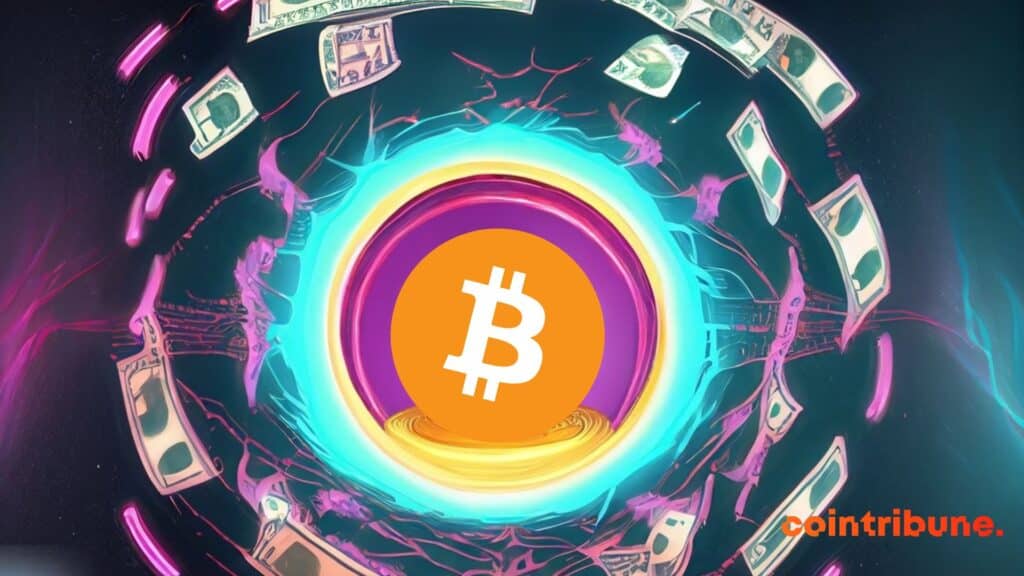Bitcoin 2030: Get ready for Hyperbitcoinization!
Hyperbitcoinization is a concept that has been theorized by some of Bitcoin’s most ardent supporters. It refers to a hypothetical state where Bitcoin would be universally accepted as currency. Is this truly credible, and what would be the consequences for the global economy?

Bitcoin’s quest for world domination
For the past few years, an especially optimistic idea has been brewing within the Bitcoin community: hyperbitcoinization. It would be a state of adoption in which bitcoin is firmly established on a global scale, supplanting the US dollar as the new monetary standard.
Hyperbitcoinization scenario 1: Credible investment and unit of account
In the first scenario that can be imagined, bitcoin would be considered a reliable unit of account by a critical mass of individuals. In this scenario, Bitcoin would replace and even go beyond the gold standard. The asset would be accepted by numerous financial institutions, people would consider it a relatively stable investment (at least as stable as gold), and a reliable method for transferring money abroad.
This could happen after decades of slow adoption of Bitcoin, with ups and downs, without disrupting the social order. It doesn’t require a fantastic imagination; it’s a scenario that could naturally unfold over time.
But what does this mean for our economy? If Bitcoin becomes a reliable unit of account, it could have a significant impact on how we do business. International transactions could become simpler and more efficient. Individuals and businesses would have more control and sovereignty over their money.
However, it’s important to note that this hyperbitcoinization scenario doesn’t mean that all transactions will be conducted in BTC. It’s likely that fiat currencies will continue to play a significant role in the global economy.
A few projections
We can envision some developments for Bitcoin within the framework of this first scenario. We can reasonably expect a reduction in Bitcoin’s volatility but also an increase in transaction fees.
Indeed, if the fees are not significantly higher, the network would be insecure. A malicious actor in one corner of the world could attempt to seize Bitcoin or launch a devastating attack to disrupt economies that have adopted it.
Hyperbitcoinization scenario 2: H-Bomb on the Fed
Let’s move on to the second hyperbitcoinization scenario.
In this scenario, Bitcoin’s meteoric rise would lead to the creation of an economic regime in which any party that chooses not to use or is excluded from the Bitcoin network would be placed at an economic disadvantage. In this scenario, fiat currency would lose its luster. Gradually, the value of the dollar, euro, or British pound would converge towards zero. Why? Because they would become less desired by economic actors. When demand for an asset wanes, its price also plummets, all else being equal.
Fiat currencies still have power
It’s important not to confuse the observation of a currency’s inflation with its decline. Historically, inflation is a long-term structural observation, and it is expected to continue in the future. Nevertheless, major currencies like the dollar are by no means in decline. A one-dollar bill may be worth less than it was 20 years ago, but the dollar is more powerful than ever. The growth in the role of the dollar goes hand in hand with the volume of goods denominated in dollars, and there are undoubtedly more and more of them.
Therefore, fiat currencies currently show no signs of decline, even if individual units are losing purchasing power due to central bank manipulations.
The H-Bomb Hyperbitcoinization scenario is only possible if nation-states voluntarily choose to relinquish their monetary power or, for some reason, lose their ability to issue fiat currencies.
A slightly utopian scenario
This second scenario is therefore much more radical and controversial. It suggests that Bitcoin could not only fill the gaps of fiat currencies but completely replace them.
This means that those who don’t adopt Bitcoin could find themselves economically disadvantaged. Just like if you were to do away with fiat currency today, you would likely face immense difficulties in receiving your salary or paying your electricity bills.
Version 2 of hyperbitcoinization requires the United States, China, the European Union, and other powerful economic entities to accept the helplessness caused by the loss of their monopoly over monetary production. Meanwhile, hundreds of trillions of dollars in value are absorbed by a headless protocol. Additionally, the rapid collapse of a fiat currency often constitutes a major disruption to the social order.
This (slightly utopian) scenario raises many questions. For example, how could such a situation come about? What could drive people to completely abandon their fiat currency in favor of Bitcoin? And what would be the effects on the global economy?
A coalition of Bitcoin-Leading states?
In the context of this total conquest scenario, we have to consider a world in which Bitcoin is controlled by a central entity. This entity could be a coalition of powerful nations or large corporations. From this perspective, those who control Bitcoin would literally control the global economy. The incentives to form coalitions and take control of the network would be extremely high.
However, even after a centralization event, we could expect market mechanisms to constrain the central validator to follow certain standards of behavior. For example, if the central validator becomes censorious or extortionate, Bitcoin would experience a depreciation in its value as users start losing trust and seeking alternatives. It’s simply an application of game theory.
A scalability issue
The Lightning Network is a second-layer solution for Bitcoin that enables instant and low-cost transactions. It’s important to note that even in the case of hyperbitcoinization, the number of transactions on the Bitcoin blockchain would remain limited. The number of Lightning channels that can be created or closed is limited by the number of transactions on the blockchain.
For hyperbitcoinization to occur, the financial system would need to accommodate billions of users by adding additional scalability layers (Layers 2, Layers 3, and so on). At this stage, it’s not clear how this could happen without financial institutions or states issuing digital debt acknowledgments (or even “Bitcoin paper”) that are essentially fiat, with the degree of trust that comes with it and the ability to print more than the protocol allows.
Hyperbitcoinization and decentralization
Under the assumption of hyperbitcoinization that retains its decentralization attributes, certain properties would remain in place as they are today:
- Mining remains decentralized, and no cartel forms to monopolize the network.
- Miners select transactions with the highest fee level and do not engage in censorship.
We could also expect the following:
- Volatility is reduced. To become a reliable unit of account, volatility must have decreased in terms of real purchasing power. Otherwise, people wouldn’t use it as a unit of account.
- A significant portion of businesses would use it. The network would be well-established and far-reaching.
- The total value would be much greater than today. If everyone uses it all the time, the demand would be incredibly high.
- The total fee market should be significant. If the fee market isn’t much larger, the network would be insecure.
Why would a state support Bitcoin?
Let’s recap the factors that could rationally motivate a state to adopt Bitcoin:
- Policymakers believe that Bitcoin facilitates trade, perhaps because it offers a superior method for settling commercial transactions with foreign partners. However, in most domestic situations, Bitcoin doesn’t add a significant advantage compared to the local currency.
- The state seeks to attract businesses or wealthy individuals to foster its economic development.
- Policymakers believe that the price of Bitcoin will increase significantly and would like the state’s coffers to benefit from this rise. It’s simply a form of speculation, as seen with the position taken by the President of El Salvador, Nayib Bukele. Of course, the downside risk must also be taken into account. Even if it works over a certain period, it’s not the same as building a sustainable growth model.
- The nation lacks a true sovereign currency and is at the mercy of central banks under external control (for example, consider the West African and Central African CFA francs).
- A nation with liberal, democratic, and capitalist principles sees Bitcoin as a subversive means to introduce its anti-state values into the monetary production system.
- Policymakers are corrupt or selfish, and they might see Bitcoin as a way to enrich themselves. They could synchronize their own purchases or sales to anticipate policy changes that could affect BTC demand. For example, if a nation-state decides to acquire Bitcoin for the treasury, selfish officials could acquire massive amounts in the days preceding the announcement. Corrupt officials could also consider Bitcoin a reliable option for accepting bribes from foreign lobbyists.
Why would a state reject Bitcoin?
Likewise, several factors could deter states from adopting the Bitcoin protocol:
Bitcoin: “a speculative thing”
- Policymakers believe that Bitcoin is little more than a casino-like entity that drains resources from productive economic development. Moreover, it’s an energy-intensive casino at a time of energy transition.
- Policymakers believe that the speculative cycle could leave behind a trail of toxic debts that would significantly harm the economy. While many stock market crashes are due to herd dynamics, a nation-state should also consider the possibility of an adversary orchestrating a malicious rugpull.
Neutralizing the competition
- The local sovereign currency fights inflation, and the addition of a fixed-supply competitor could exacerbate inflationary pressures. In general, economic policymakers pursue growth policies that maximize real growth and not just protect the value of their currency. However, if the value of the currency declines to the point where inflation hampers economic activity, policymakers would be wise to take measures to combat it. This could backfire. A ban on Bitcoin could be perceived as a desperate attempt to save a failing currency and push more citizens to hold BTC.
Preserving monetary privilege
- The nation-state would prefer economic growth to flow into their own currency rather than sharing wealth with international holders. They see their economy as more productive compared to other national economies. If domestic economic growth occurs within a Bitcoin economy, the network’s purchasing power increases, enriching other parties that may or may not have contributed. Free-rider dynamics are not conducive to protecting one’s own interests.
- The nation-state benefits from using its own currency as an international reserve (notably the US and their exorbitant privilege, which allows them to borrow without bearing the real cost of such irresponsibility). Encouraging Bitcoin’s growth risks losing this advantage.
Hyperbitcoinization is a fascinating concept that raises many questions about the future of our global economy. While the idea of universally accepted uncontrollable currency is appealing, there are still many hurdles to overcome before it becomes a reality. Regardless of what the future holds, even if hyperbitcoinization doesn’t occur, it doesn’t mean that Bitcoin lacks value. Bitcoin has already proven its worth as a censorship-resistant store of value. It has already changed the way we think about money and finance, and it will likely continue to do so in the years to come.
Maximize your Cointribune experience with our "Read to Earn" program! For every article you read, earn points and access exclusive rewards. Sign up now and start earning benefits.

Chaque jour, j’essaie d’enrichir mes connaissances sur cette révolution qui permettra à l’humanité d’avancer dans sa conquête de liberté.
The views, thoughts, and opinions expressed in this article belong solely to the author, and should not be taken as investment advice. Do your own research before taking any investment decisions.